Herbalism
Who Is the Most Famous Herbalist in the World?
Meet Rosemary Gladstar, the trailblazing herbalist who has inspired generations with her pioneering work in popularizing herbal remedies.

We consider Rosemary Gladstar, known as the 'Godmother of American Herbalism,' to be the most famous herbalist in the world. Her contributions to modern herbalism, including founding the California School of Herbal Studies and United Plant Savers, have inspired generations of herbalists. Other renowned herbalists, such as Nicholas Culpeper, Avicenna, and Hildegard von Bingen, have also made significant impacts on the field. However, Gladstar's pioneering work in popularizing herbal remedies and her holistic approach to health and wellness set her apart. As we explore the world of herbalism further, we uncover the rich legacies of these legendary figures and their lasting influences on modern practice.
Key Takeaways
• Rosemary Gladstar is known as the 'Godmother of American Herbalism' and founded the California School of Herbal Studies and United Plant Savers.
• Nicholas Culpeper's 'The English Physician' made herbal medicine accessible to the common people, earning him a renowned reputation in herbalism.
• Avicenna's 'Canon of Medicine' shaped herbal practices for centuries, solidifying his position as a famous herbalist in history.
• Hildegard von Bingen's holistic approach to healing and extensive writings on herbal medicine have made her a notable figure in herbalism.
• Rosemary Gladstar's contributions to modern herbalism, including founding the International Herb Symposium and Botanical Sanctuary, have made her the most famous herbalist in the world.
Early Pioneers of Herbal Medicine
Among the earliest champions of herbal medicine were ancient Greek and Roman physicians like Hippocrates, Dioscorides, and Galen, who laid the groundwork for future generations of herbalists. We recognize their significant contributions to the development of herbal healing, which has been a cornerstone of traditional medicine for centuries.
As herbalists, they understood the importance of harnessing the power of plants to promote health and wellness. Their pioneering work paved the way for others to build upon, including the creation of extensive herbal encyclopedias and foundational texts in both Islamic and Western medicine.
We appreciate how these early pioneers of herbal medicine helped shape our understanding of the complex relationships between plants, humans, and the natural world. Their legacy continues to inspire new generations of herbalists, ensuring that the art of herbal healing remains an essential component of modern healthcare.
Famous Herbalists Throughout History

As we explore the foundation laid by these early pioneers, we're drawn to the remarkable stories of famous herbalists throughout history who've shaped our understanding of herbal medicine.
From Nicholas Culpeper's 'The English Physician' to Avicenna's 'Canon of Medicine', these trailblazers have left an indelible mark on the field.
Hildegard von Bingen's 'Physica' and John Gerard's 'The Herball or Generall Historie of Plantes' are evidence of their groundbreaking work.
Paracelsus, meanwhile, is credited with pioneering medical chemistry and emphasizing the use of botanical remedies.
Their contributions have paved the way for modern herbalists like Rosemary Gladstar, who's been instrumental in popularizing herbal remedies and promoting the importance of Materia Medica.
As we immerse ourselves in the world of herbal medicine, we're reminded of the significance of these pioneers, whose work continues to inspire and inform our understanding of herbal remedies and their healing properties.
The Rise of Modern Herbalism

As we explore the rise of modern herbalism, we're witnessing a fascinating convergence of ancient traditions and modern innovation.
This herbal renaissance begins with a renewed interest in natural remedies, holistic health, and sustainable living practices, which has led to a revival of ancient wisdom and a modern take on traditional plant medicine.
We'll examine how this movement has given birth to a new era of herbalism, characterized by accessible remedies, a blend of traditional knowledge and scientific research, and a growing community of practitioners.
Herbal Renaissance Begins
Embracing a holistic approach to health, we witnessed the Herbal Renaissance, a transformative period in the late 20th century that revitalized interest in herbal medicine and propelled it into the modern era. This resurgence in herbalism marked a significant shift towards natural healing, sustainability, and honoring traditional herbal practices.
As we explored further into the world of conventional medicine, we saw a renewed emphasis on plant conservation and the integration of herbalism into modern healthcare practices. Herbalists like Rosemary Gladstar played a pivotal role in popularizing herbal medicine during this period, contributing to its widespread recognition and celebration.
The Herbal Renaissance was characterized by a growing awareness of the importance of holistic health, and we saw a surge in the use of herbal remedies as people sought alternative approaches to wellness. As we delved deeper into the world of herbal medicine, we began to appreciate the rich cultural heritage and traditional practices that underpinned this ancient art.
The Herbal Renaissance was a pivotal moment in the history of herbalism, setting the stage for its continued growth and evolution in the modern era.
Ancient Wisdom Revived
We build upon the momentum of the Herbal Renaissance, where the revival of ancient wisdom has led to the rise of modern herbalism, an era characterized by a fusion of traditional knowledge and scientific innovation.
As we explore the world of modern herbalism, we're met with a dynamic fusion of ancient healing traditions and cutting-edge research. This synergy has given birth to a new generation of herbalists who combine the wisdom of the past with the latest scientific discoveries. The result is a holistic approach to healthcare that's both sustainable and personalized.
The global herbalism movement is thriving, driven by a diverse community of practitioners, educators, and advocates who champion the benefits of plant-based healing. As we navigate the complexities of modern health, herbalism offers a beacon of hope, providing a natural, effective, and empowering approach to wellness.
Nature's Pharmacy
Today, we're witnessing a significant resurgence of interest in nature's pharmacy, where ancient wisdom meets cutting-edge science to create a new era of modern herbalism. As we explore further into this domain, we're struck by the growing demand for natural remedies and plant-based healing.
The rise of modern herbalism can be attributed to factors like increased awareness of sustainable practices and a desire for holistic health approaches. Herbalists today combine traditional knowledge with scientific research to create effective herbal remedies. This synergy has led to the development of a wide range of herbal products, from teas and tinctures to skincare and supplements.
As a result, modern herbalists play a vital role in educating the public about the benefits of herbal medicine and promoting sustainable practices in the field. By embracing medicinal herbs, we're not only improving our health but also contributing to a more eco-friendly future.
As we explore the world of herbalism, we're reminded that nature's pharmacy holds the key to a healthier, more sustainable tomorrow.
Notable Herbalists of the Past
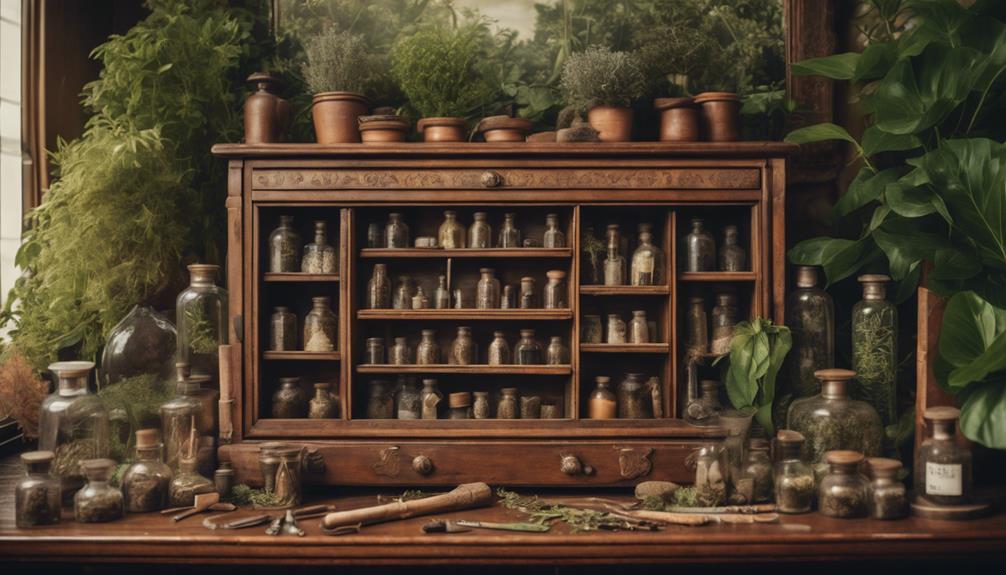
As we delve into the domain of notable herbalists of the past, we'll examine the significant contributions of ancient Greek herbalists, who laid the groundwork for Western herbalism.
We'll also investigate medieval European practices, which often intertwined herbalism with spirituality and mysticism.
Meanwhile, traditional Chinese roots will reveal the rich history of herbalism in Eastern cultures, showcasing the diversity of herbal traditions that have shaped the modern practice.
Ancient Greek Herbalists
Among the earliest recorded herbalists, ancient Greek physicians Dioscorides, Hippocrates, and Galen played a pivotal role in laying the groundwork for modern herbal medicine. These pioneers of herbalism made significant contributions to the development of medicine, particularly in the use of herbs.
Dioscorides, a Greek physician, wrote the thorough herbal encyclopedia 'De Materia Medica,' which remains a valuable resource to this day. Hippocrates, known as the 'Father of Medicine,' emphasized the importance of natural remedies and herbs in his School of Medicine. He believed in the concept of 'vis medicatrix naturae,' or the healing power of nature. Galen, another influential Greek physician, further expanded on herbal medicine principles in the Roman Empire.
Their collective work not only shaped the course of herbalism but also laid the foundation for modern medicine. Their emphasis on natural remedies and herbs paved the way for future generations of herbalists, solidifying their place as among the most notable herbalists of the past.
Medieval European Practices
During the medieval period, we find a wide-ranging array of herbalists who made a significant contribution to the evolution of herbal medicine in Europe. These pioneers in herbalism paved the way for the development of modern herbal practices. Hildegard von Bingen, a renowned German Benedictine abbess, was a notable herbalist known for her holistic approach to healing. She wrote extensively on the use of herbs in medicine, showcasing her deep understanding of the subject.
Some notable medieval herbalists include:
- Nicholas Culpeper, an English physician who gained fame for his herbal remedies and astrology-influenced medical practices.
- Avicenna, a Persian polymath who made significant contributions to herbal medicine through his influential work, the Canon of Medicine.
- Paracelsus, a Swiss physician and alchemist who revolutionized herbalism with his innovative approach to medicine.
These medieval herbalists laid the groundwork for the development of modern herbalism, influencing the course of herbal studies.
Today, institutions like the School of Herbal Studies offer detailed herbal courses, teaching the art and science of herbalism to a new generation of herbalists. The art of herbalism continues to evolve, building upon the foundations laid by these medieval pioneers.
Traditional Chinese Roots
We shift our focus to the ancient roots of Traditional Chinese herbalism, where we find a rich history of notable herbalists who've shaped the practice. This traditional approach dates back thousands of years, rooted in the philosophy of Yin and Yang and the Five Elements.
Notable ancient Chinese herbalists include Shennong, known as the 'Divine Farmer,' and Li Shizhen, author of the famous Compendium of Materia Medica. Traditional Chinese herbal medicine emphasizes balancing the body's energy, or Qi, through the use of herbs, acupuncture, and other holistic practices.
Chinese herbalists often use combinations of herbs, known as formulas, tailored to individual patients' specific needs and imbalances. This holistic approach has led to the establishment of institutions like the California School of Herbal Studies, founded by Michael Moore, which offered courses at the Mountain Herbal Retreat Center.
Today, Chinese herbal medicine continues to be widely practiced and respected worldwide for its holistic approach to health and wellness. As we explore the most famous herbalist in the world, we acknowledge the significant contributions of these ancient practitioners who paved the way for modern herbalism.
Influential Figures in Herbalism
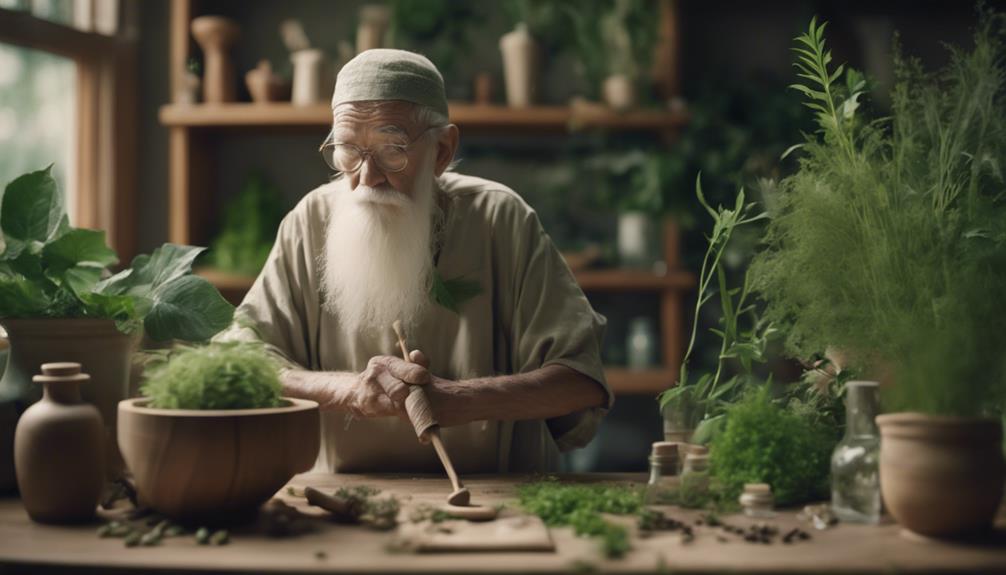
Meet the pioneers who've shaped the world of herbalism, leaving an indelible mark on the industry. We're talking about the trailblazers who've made significant contributions to the field, paving the way for future generations.
Some notable figures include:
- Rosemary Gladstar, known as the 'Godmother of American Herbalism', who's been instrumental in popularizing herbalism in the US.
- Christopher Hobbs, a founding member of the American Herbalists Guild, with over 35 years of experience in herbalism.
- Mark Blumenthal, founder of the American Botanical Council, who's also an experienced herbal product industry advisor.
These influential figures have been involved in various initiatives, such as the United Plant Savers, the International Herb Symposium, and the American Botanical Council, which have played an important role in promoting herbalism and its benefits.
Their work hasn't only raised awareness about the importance of herbalism but has also led to the development of new products and therapies. As we explore further into the world of herbalism, it's important to acknowledge the contributions of these pioneers who've helped shape the industry into what it's today.
Herbal Legends and Their Contributions
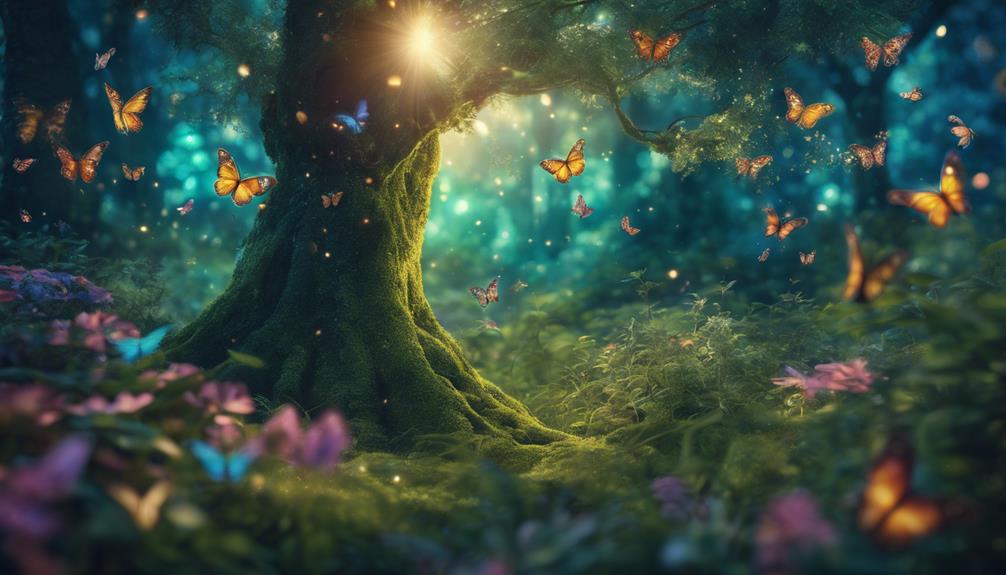
Among the most revered herbal legends are individuals who've left an indelible mark on the world of herbalism, shaping its evolution with their groundbreaking contributions. We're talking about pioneers like Rosemary Gladstar, who founded the California School of Herbal Studies and United Plant Savers, and Avicenna, whose influential medical encyclopedia, 'Canon of Medicine,' has shaped herbal practices for centuries.
Nicholas Culpeper, an English herbalist, revolutionized herbal medicine by making it accessible to the common people through his book 'The English Physician.' Hildegard von Bingen, a German Benedictine abbess and herbalist, contributed significantly to herbal medicine with her holistic approach to healing and botanical knowledge.
Samuel Thomson, an American herbalist, founded the Thomsonian System of Medicine, emphasizing the use of herbal remedies for health. These legends have paved the way for modern herbalists, influencing organizations like the International Herb Association, where Rosemary Gladstar serves on the Board of Directors.
Today, their contributions continue to inspire herbalists at Sage Mountain Herbal Retreat and beyond.
The Most Famous Herbalists Ranked
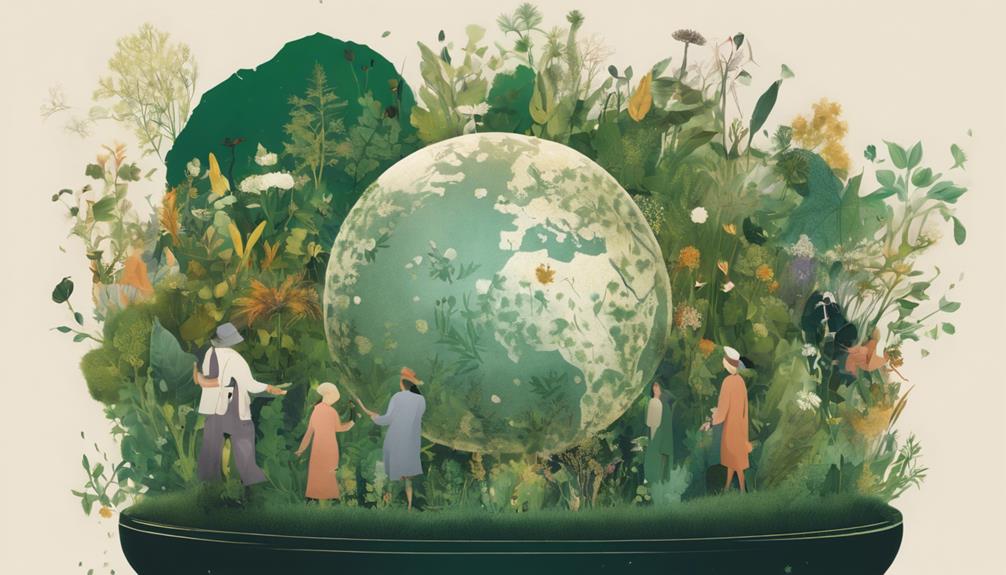
Ranking the most famous herbalists of all time is no easy feat, but based on their lasting impact and widespread recognition, we've compiled a list of the top herbalists who've left an indelible mark on the world of herbalism.
Here are the top three most famous herbalists:
- Rosemary Gladstar: Known as the 'Godmother of Herbalism,' she founded the International Herb Symposium and the Botanical Sanctuary, and wrote Recipes for Vibrant Health.
- Nicholas Culpeper: A 17th-century English herbalist, he's renowned for his herbal remedies and astrological connections to herbology.
- Avicenna: A Persian physician in the 10th century, he made significant contributions to herbal medicine with his work in 'The Canon of Medicine.'
These herbalists haven't only shaped the course of herbalism but have also inspired generations of practitioners. Their work continues to influence modern herbalism, making them the most famous and revered in the field.
Herbalism's Greatest Contributors
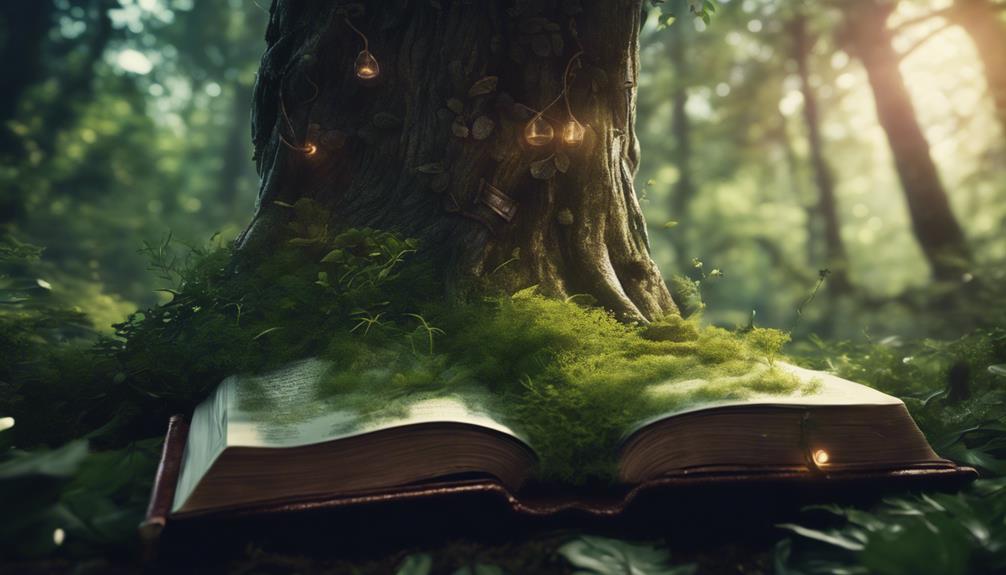
As we explore the domain of herbalism's greatest contributors, it's important to recognize the pioneers who've influenced the field with their groundbreaking discoveries and innovative approaches.
One such renowned herbalist is Rosemary Gladstar, who's left an indelible mark on the world of herbalism. With over 40 years of experience, Gladstar's contributions have been multifaceted, from founding the California School of Herbal Studies to co-founding the New England Women's Herbal Conference.
Her books, such as 'Rosemary Gladstar's Herbal Healing for Men' and 'Herbs for Natural Beauty,' have educated and inspired countless individuals in the field. Additionally, her dedication to conservation and sustainability is evident in her founding of United Plant Savers, a non-profit organization, and Sage Mountain Herbal Retreat Center.
As a famous herbalist, Gladstar's influence, reputation, and popularity have solidified her position as a leading figure in the world of herbalism. Her groundbreaking work has paved the way for future generations of herbalists, earning her a place among herbalism's greatest contributors.
Legendary Herbalists of All Time

Throughout history, legendary herbalists have shaped the course of botanical medicine, leaving an enduring legacy that continues to inspire and educate us today. As we explore the world of natural healing, we're reminded of the pioneers who've paved the way for modern herbalism.
Some of the most notable legends include:
- Nicholas Culpeper, whose book 'The English Physician' remains an influential guide to herbal remedies.
- Avicenna, whose 'Canon of Medicine' is still revered as a fundamental medical text.
- Hildegard von Bingen, a German abbess whose writings on natural remedies and healing continue to inspire herbalists worldwide.
These trailblazers have contributed greatly to our understanding of herbalism, enabling us to harness the power of plants for natural healing.
As we navigate the world of herbalism, we're constantly reminded of the rich heritage that underpins this ancient practice. From Culpeper's astrological approach to Avicenna's philosophical insights, each legendary herbalist has left an indelible mark on the world of botanical medicine.
Frequently Asked Questions
Who Is the Best Herbalist in the World?
We're often asked who we think is the best herbalist in the world, and honestly, it's subjective – what makes someone "best"? Is it expertise, innovation, or dedication? We think it's a mix of all three, and Rosemary Gladstar embodies that perfectly.
Who Is the Father of Herbalism?
It is evident that the answer lies in ancient Greece, where Hippocrates, a renowned physician, pioneered herbal remedies, earning him the title 'Father of Herbalism' for his groundbreaking contributions to medicine and holistic healing practices.
Who Are the Famous Female Herbalists?
As we explore the world of herbalism, we're reminded of the wise words of Rosemary Gladstar, 'The plant people are the guardians of the earth.' We celebrate renowned female herbalists like Susun Weed, Aviva Romm, Maria Noel Groves, and Marlene Adelmann, pioneers in their field.
Which Is the Most Powerful Herb?
We're curious about the most powerful herb, and after researching, we think it's Ashwagandha, an adaptogen that boosts energy, reduces stress, and enhances cognitive function – its benefits are undeniable!
Conclusion
To sum up, we've explored the world of herbalism, investigating the pioneers, legends, and influencers who've shaped this ancient practice.
It's noteworthy that a staggering 80% of the global population still relies on traditional herbal remedies as their primary source of healthcare.
As we reflect on the contributions of these herbal giants, we're reminded of the profound impact they've had on modern medicine and our collective well-being.
Their legacies continue to inspire and educate, ensuring the timeless wisdom of herbalism endures.
Herbalism
Where to Learn Herbalism: Top 7 Starting Points
Pursue the path to herbalism mastery by uncovering the top 7 starting points that will propel your journey to new heights.

We're excited to start our herbalism journey! To get started, we'll need to find trusted trainers in major cities who can guide us in honing our skills. We'll also need essential tools like the Herbalist's Spade and useful addons like Gathermate2 to track herb node locations. Exploring starting zones like Durotar and Elwynn Forest helps us discover low-level herbs like Peacebloom and Silverleaf. As we progress, we'll master gathering etiquette, learn basic herb identification, and expand our knowledge. From here, we'll take our herbalism practice to the next level by staying curious and seeking out new information.
Key Takeaways
• Find Herbalism trainers in major cities like Stormwind and Orgrimmar for expert guidance on honing your Herbalism skill.
• Obtain an Herbalist's Spade, an essential tool for gathering herbs, from vendors in main cities.
• Explore starting zones like Durotar, Mulgore, and Elwynn Forest to discover low-level herbs like Peacebloom and Silverleaf.
• Seek out trainers in main cities to learn the basics of Herbalism and purchase necessary tools.
• Utilize Gathermate2 addon to track herb node locations and optimize your gathering route.
Finding Herbalism Trainers
We can find herbalism trainers in major cities, where they're readily available to help us master the craft. In these bustling hubs, we can seek out experts who'll guide us in honing our Herbalism skill.
For Alliance players, Tannysa in Stormwind City and Reyna Stonebranch in Ironforge are ready to lend a hand. Meanwhile, Horde players can turn to Jandi in Orgrimmar and Martha Alliestar in Undercity for guidance.
What's more, trainers in The Burning Crusade expansion can be found in Thrallmar and Honor Hold. The great news is that we don't need to visit different trainers for each Herbalism level; these trainers offer all levels of training. This convenience means we can focus on learning and improving our Herbalism skill without worrying about tracking down multiple trainers.
Essential Gathering Tools

With our trainers identified, we're now ready to equip ourselves with the right tools to gather herbs efficiently.
In the world of Herbalism, having the right gear is essential to collecting those elusive herbs. First and foremost, we need a trusty Herbalists Spade, an indispensable tool for any aspiring herbalist. This spade allows us to gather herbs without damaging the plants, ensuring we can come back for more.
Additionally, we can utilize the Gathermate2 addon to track herb node locations, making our gathering process more efficient.
Our trainers in main cities like Orgrimmar and Stormwind taught us the basics of Herbalism, and now it's time to put that knowledge into practice. As we venture into starting zones, we'll encounter specific herbs like Peacebloom and Silverleaf, which will help us hone our skills.
With our tools in hand, we're ready to explore the world of Herbalism and start gathering those precious herbs.
Exploring Starting Zones

Venturing into starting zones like Durotar, Mulgore, Tirisfal Glades, Elwynn Forest, and Teldrassil, we'll find a treasure trove of low-level herbs to kickstart our Herbalism journey. These zones are perfect for Apprentice Herbalism, offering an abundance of Peacebloom, Silverleaf, and Earthroot to aid in our skill progression from 1 to 70 points.
| Starting Zone | Common Herbs Found |
|---|---|
| Durotar | Peacebloom, Silverleaf |
| Mulgore | Earthroot, Peacebloom |
| Tirisfal Glades | Silverleaf, Earthroot |
| Elwynn Forest | Peacebloom, Silverleaf |
| Teldrassil | Earthroot, Peacebloom |
To further facilitate our Herbalism journey, we can seek out Herbalism trainers in major cities like Stormwind, Orgrimmar, Ironforge, and Thunder Bluff for Apprentice Herbalism training. Additionally, purchasing a Herbalist's Spade from vendors can aid in our exploration and gathering of herbs in these starting zones. By exploring these zones, we'll not only find the necessary herbs but also level our Herbalism skills efficiently.
Mastering Gathering Etiquette

As we venture into the domain of Mastering Gathering Etiquette, we're reminded that respecting the land and adopting ethical harvesting practices are vital aspects of responsible herbalism.
We'll explore the significance of sustainable gathering methods that guarantee the long-term health of the environment and the herbs we rely on. By adopting mindful practices, we can secure a thriving ecosystem that benefits both the land and our herbal pursuits.
Respecting the Land
We take pride in respecting the land by adopting mindful gathering habits. As herbalists, we recognize the importance of preserving the natural balance and avoiding over-harvesting of herb nodes. By doing so, we guarantee the sustainability of our gathering profession and promote a cooperative gathering experience.
When gathering herbs, we make it a point to communicate with other players in the area to coordinate our efforts. This not only helps us avoid depleting the herb nodes but also allows multiple players to gather from the same plant.
We practice good gathering etiquette by refraining from looting herb nodes immediately, giving others a chance to gather as well. By sharing nodes with our party members, we foster a sense of community and cooperation.
Ethical Harvesting Practices
When gathering herbs, we must prioritize ethical harvesting practices to secure the long-term sustainability of our craft. As herbalists, we've a responsibility to respect the land, the plants, and the ecosystems we interact with.
This means following local regulations and guidelines for sustainable harvesting practices, ensuring we don't over-harvest and deplete natural resources. We must also consider the impact of our harvesting on local wildlife and ecosystems, avoiding practices that could harm or disrupt natural habitats.
Before harvesting on private property or protected land, we must ask permission, and always prioritize sustainable practices that allow for natural regeneration. Additionally, educating ourselves on endangered or protected plant species in our region is essential, so we can avoid harvesting them and contribute to their preservation.
Basic Herb Identification
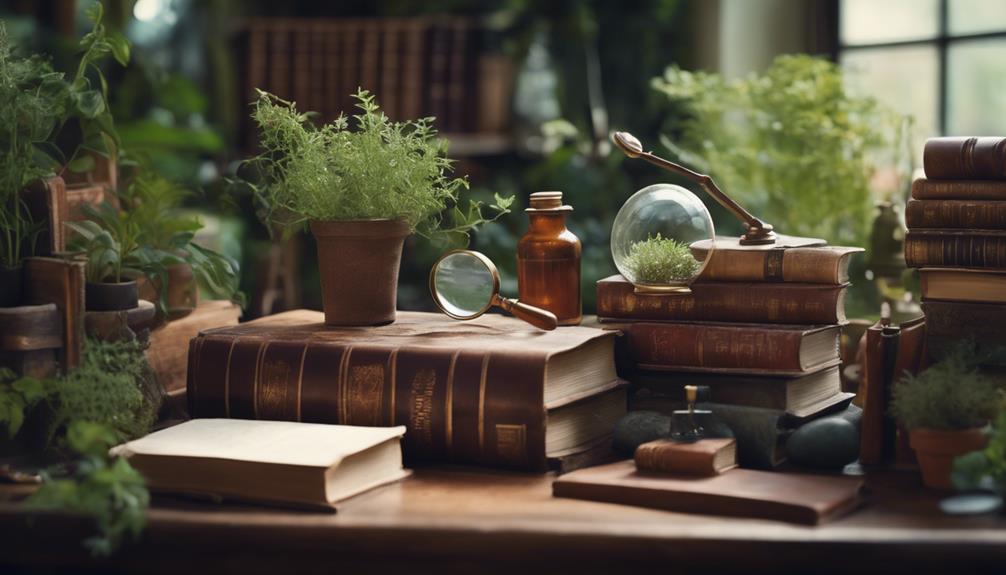
Our journey into basic herb identification begins with recognizing key features like leaf shape, color, scent, and growth patterns that distinguish one herb from another. As we explore further into herbalism, understanding these key features becomes essential in accurately identifying herbs.
We learn to recognize patterns within plant families, as many herbs share similarities within the same family.
We examine the plant's stem, flowers, and roots to gather valuable clues for identification.
We utilize field guides, herb identification apps, and online resources to aid in our learning.
We practice and gain hands-on experience to hone our skills and become proficient in distinguishing various plants.
Leveling Up Quickly

As we aim to advance our Herbalism skills quickly, we'll need to adopt strategies that accelerate our progress.
We'll explore three key approaches to rapid skill development: Fast Track Learning, Expert Mentorship, and Focused Study Plans.
Fast Track Learning
We can greatly accelerate our herbalism learning journey by focusing on high-impact activities that deliver maximum results in minimal time. To level up quickly, we need to strategically allocate our time and energy on the most rewarding tasks. This approach is reminiscent of World of Warcraft (WoW) Herbalism, where players focus on maximizing their skill points to level their Herbalism Profession efficiently.
To fast track our learning, we should:
- Prioritize practical experience: Focus on finding and identifying herbs in their natural habitats to gain hands-on experience.
- Study herbalism fundamentals: Master the basics of herbalism, such as understanding plant anatomy and pharmacology, to build a solid foundation.
- Learn from experienced herbalists: Seek guidance from seasoned professionals to gain valuable insights and avoid common pitfalls.
- Set achievable goals and track progress: Break down our learning journey into manageable tasks and track our progress to stay motivated and focused.
Expert Mentorship
By seeking guidance from experienced herbalists, we can shortcut our learning curve and level up our herbalism skills quickly. This is where expert mentorship comes in – a game-changer for efficient leveling.
We can find these mentors in major cities like Stormwind or Orgrimmar, where they can share their knowledge on the best gathering routes, optimizing our skill progression. By learning from an expert mentor, we can avoid common mistakes and pitfalls, saving us time and resources.
Joining herbalism-focused guilds or communities can also connect us with knowledgeable mentors who can aid in our skill development. With their guidance, we can navigate the complexities of herbalism and accelerate our progress.
By tapping into their expertise, we can refine our techniques, identify the most lucrative gathering routes, and streamline our workflow. With the right mentorship, we can fast-track our herbalism skills and take our practice to the next level.
Focused Study Plans
To accelerate our Herbalism progress, we'll need a strategic plan that streamlines our gathering routes and targets the most valuable herbs. This focused study plan will help us level up quickly and efficiently, maximizing our gathering potential.
To achieve this, we can follow a step-by-step guide that takes us from Apprentice to Master skill levels in Herbalism. We can utilize addons like Gathermate2 and tools like Herbalists Spade to enhance our training. Understanding specific herb locations and skill requirements is essential for the best progression in Herbalism. By focusing on key herbs in designated zones, we can effectively level up our Herbalism skill.
Here are some essential tips to keep in mind:
- Learn Journeyman Herbalism from any Herbalism trainer to access higher-level herbs
- Focus on the best zones for Herbalism leveling, such as Ashenvale and Stonard
- Master Classic Herbalism to learn Artisan-level recipes
- Progress through the levels of Herbalism, from Apprentice to Master, to access new herbs and recipes
Expanding Your Herbalism Knowledge

As we explore further into the world of herbalism, we'll investigate various ways to expand our knowledge, from experimenting with new herbs to building a thorough library of informative resources.
We can learn new skills, just like leveling up in WoW Classic, by venturing into uncharted zones of herbalism, such as exploring the subtle differences between various herbal traditions. Our trainer, Kristen Boye, a natural health expert, can guide us through the process.
To reach the next level, we need to absorb knowledge from diverse sources, including books, online resources, and hands-on experience. Building an extensive library of herbalism books will provide a solid foundation for our journey.
Additionally, we can learn from others in the herbalism community, who've already traversed these zones, and gain valuable insights from their experiences. By expanding our knowledge, we'll become more confident in our abilities, much like advancing to a higher level in WoW Classic.
With persistence and dedication, we'll acquire new skills, and our herbalism practice will flourish.
Frequently Asked Questions
How Do I Start Studying Herbalism?
We're enthusiastic to immerse ourselves in the world of herbalism, and we're not alone! To start studying herbalism, we begin by researching reputable schools and programs online. We also look for local workshops and introductory courses to get our feet wet.
Additionally, we devour books, online resources, and videos that cover the fundamentals. By connecting with experienced practitioners and experimenting with herbs in our daily lives, we're well on our way to deepening our understanding of this ancient practice.
Can I Teach Myself Herbalism?
'Knowledge is power, and power is knowledge' – we firmly believe that with dedication and persistence, we can teach ourselves herbalism.
By taking the initiative to research, experiment, and connect with experienced herbalists, we can gain a deep understanding of herbalism.
We can start by learning about basic herb properties, safety guidelines, and common uses, and then gradually expand our knowledge and skills.
With patience and practice, we can become proficient in herbalism without relying on formal education.
How to Get Herbalism Knowledge Points?
We're excited to learn how to get those precious herbalism knowledge points!
We've discovered that completing herbalism quests, like the Herbalism War Effort, rewards us with points.
Gathering herbs also earns us points, with rarer herbs yielding more points.
Training with herbalism trainers at higher skill levels grants points too.
Additionally, crafting potions and identifying herbs can boost our knowledge points.
Where to Learn Herbalism in Shadowlands?
As we explore the Shadowlands, we're excited to uncover the secrets of herbalism.
Unlike in WoW Classic, we won't find trainers in major cities teaching us the ways of herbalism. Instead, we'll need to seek out new mentors in this mystical domain.
We're on the hunt for Shadowlands' herbalism trainers, and we're not sure where to start. Let's set out on this journey together, discovering the hidden gems of herbalism knowledge in this uncharted territory.
Conclusion
In our journey to learn herbalism, we've discovered a wealth of resources to guide us. From finding experienced trainers to mastering gathering etiquette, we've explored the essential starting points.
Surprisingly, did you know that the global herbal supplements market is projected to reach $12.8 billion by 2025?
As we continue to expand our knowledge, we'll uncover the vast potential of herbalism. With a solid foundation, we're ready to further explore the world of herbalism, equipped with the skills and knowledge to thrive in this ancient practice.
Herbalism
Where to Get Herbalism for Beginners
Taking the first step into the world of herbalism, discover the best resources for beginners, from online courses to local classes and expert guidance.

We're starting our herbalism journey by exploring various resources that cater to beginners. We can enroll in online courses like the Master Herbalist program or Making Herbal course, which offer flexible learning experiences, valuable resources, and lifetime access to course material. Local classes and communities, such as those found at community centers or botanical gardens, provide hands-on experience and personalized guidance. We can also access online resources, like The Herbal Academy, which offers courses, videos, and guidance on sustainable herb choices and herbal safety. As we venture into the world of herbalism, we'll uncover more tools and knowledge to support our growth.
Key Takeaways
• Enroll in online courses like the Master Herbalist program or Making Herbal course for flexible and detailed learning experiences.
• Explore recommended books like 'Rosemary Gladstar's Medicinal Herbs' and 'The Modern Herbal Dispensatory' for self-education in herbalism.
• Attend local classes at community centers, botanical gardens, or herbal stores for hands-on experience and personalized guidance.
• Utilize online resources like The Herbal Academy for step-by-step guidance, practical tips, and hands-on lessons on herbalism for beginners.
• Join online forums, Facebook groups, and social media platforms to connect with herbalism communities and network with other beginners.
Getting Started With Herbalism
To kick off our herbalism journey, let's begin by selecting a dozen safe and sustainable herbs that align with our personal health and wellness goals. For beginners, it's crucial to choose herbs that are gentle, non-invasive, and easy to work with.
We should consider herbs that are readily available, affordable, and easy to source. We'll focus on herbs that are gentle on our systems, yet effective in promoting overall wellness. By selecting sustainable herbs, we're ensuring that our herbalism practice is environmentally friendly and responsible.
We'll explore herbs that can be easily integrated into our daily lives, such as herbal teas, tinctures, and topical applications. We'll also consider recommended books for self-education, providing us with a solid foundation in herbalism.
Best Online Herbalism Courses

We're taking our herbalism education to the next level by enrolling in online courses that offer a detailed and all-encompassing learning experience. These courses provide flexibility, allowing us to learn at our own pace, and cover a range of topics from basic herbal actions to making herbal preparations. We gain access to valuable resources like handouts, charts, and ebooks, which enhance our learning experience. Plus, with lifetime access, we can continuously learn and reference the material as needed.
The School of Natural Healing, for instance, offers a thorough Master Herbalist program that explores the world of medicinal herbs and custom remedies. We can explore over 65 medicinal herbs and learn how to create effective herbal remedies.
Making Herbal, another popular online course, provides in-depth knowledge on herbalism, covering topics like herbal medicine making, herbal therapeutics, and herbal pharmacy. These online courses are perfect for beginners, offering a solid foundation in herbalism and paving the way for a deeper understanding of this ancient practice.
Herbalism Books for Beginners

We've curated a list of essential herbalism books that serve as a thorough foundation for beginners, providing practical guidance and insights into the world of herbal remedies. These books are perfect for those just starting to explore the world of herbs and herbal medicine.
| Book Title | Author |
|---|---|
| Rosemary Gladstar's Medicinal Herbs: A Beginner's Guide | Rosemary Gladstar |
| The Herbal Medicine-Maker's Handbook: A Home Manual | James Green |
| The Modern Herbal Dispensatory: A Medicine-Making Guide | Thomas Easley and Steven Horne |
| Alchemy of Herbs: Transform Everyday Ingredients into Foods and Remedies That Heal | Rosalee de la Forêt |
| The Complete Book of Herbs: A Practical Guide to Growing and Using Herbs | Lesley Bremness |
These books offer a thorough guide to herbalism, covering topics such as herb cultivation, herbal remedies, and medicine-making. They provide a solid foundation for beginners looking to explore the world of herbal medicine. With these books, you'll gain a deeper understanding of herbs and how to use them to promote health and wellness. Whether you're interested in growing your own herbs or creating herbal remedies, these books are an excellent starting point for your herbalism journey.
Local Herbalism Classes Near Me

To take our herbalism journey to the next level, let's explore local herbalism classes near us, which offer hands-on experience and personalized guidance from experienced herbalists. We can start by checking with local community centers, botanical gardens, or herbal stores for beginner herbalism courses. These classes provide a great opportunity to learn from experienced herbalists and get hands-on practice.
We can also look for herbal workshops or classes at local universities, colleges, or holistic health centers. Additionally, reaching out to local herbalists or herbalist organizations can provide valuable information on beginner herbalism courses or workshops. Online platforms like Meetup or Eventbrite can also be explored for listings of local herbalism classes and workshops.
Herbalism Communities to Join

Moreover, joining herbalism communities is a great way to surround ourselves with like-minded individuals who share our passion for herbalism and accelerate our learning journey.
We can start by connecting with online forums and Facebook groups, where we can engage with fellow beginners and experienced herbalists alike. This allows us to learn from their experiences, ask questions, and share our own discoveries.
Additionally, attending local workshops, classes, or meetups is an excellent way to network with others who share our interest in learning about herbalism. We can also consider enrolling in a herbalism course or membership site specifically designed for beginners, which provides structured learning and support.
Engaging with herbalism communities on social media platforms like Instagram and Twitter can help us stay updated on the latest trends and resources. By surrounding ourselves with like-minded individuals, we can deepen our understanding of herbalism and stay motivated on our learning journey.
Online Herbalism Resources Guide

With just a few clicks, we can access a wealth of online herbalism resources, offering us a convenient and flexible way to immerse ourselves in the world of herbalism from the comfort of our own homes. These resources provide an incredible opportunity to learn about herbalism at our own pace, whenever and wherever we want.
We can find a plethora of information on the basics of herbalism, herb selection, preparations, and applications through online resources. These resources often provide step-by-step guidance, practical tips, and hands-on lessons for beginners to start their herbalism journey.
Some online resources that can help us get started with herbalism include:
- Online courses and webinars that offer in-depth lessons on herbalism
- eBooks and guides that provide detailed information on using herbs for common ailments
- Online communities that offer help and support in making herbal remedies and understanding their applications
Herbalism Supply Stores Near Me

As we venture beyond online resources, we're likely to find that having a reliable local supplier can greatly enhance our herbalism practice, and fortunately, we can find excellent herbalism supply stores near us that cater to our needs. One such store is Yardstick Books, located at 317 Steele St., Algoma, WI 54201. This local supply store offers a variety of herbalism resources for beginners, including essential oils, medicinal herbs, and tools. We can explore their assortment of herbalism books, tools, and essential supplies for a thorough learning experience.
| Store Name | Address | Contact |
|---|---|---|
| Yardstick Books | 317 Steele St., Algoma, WI 54201 | 920-487-8174 |
While shopping online at Mountain Rose Herbs is convenient, visiting a local store like Yardstick Books allows us to engage with knowledgeable staff, ask questions, and get hands-on experience with the products. By supporting local businesses, we can build a stronger herbalism community.
Beginner-Friendly Herbalism Websites

We turn to the internet, where a plethora of beginner-friendly herbalism websites await, offering a treasure trove of introductory information and resources to launch our herbalism journey. These websites are designed to help us get started with herbalism, providing a solid foundation for our learning.
Some excellent resources include:
- HerbMentor: A detailed online school of herbalism that offers courses, articles, and community forums tailored for beginners in herbalism.
- LearningHerbs: A website that provides a wealth of information on basic herbal actions, properties of herbs, and tips on incorporating herbs into daily life.
- The Herbal Academy: A platform that offers courses, videos, and resources on sustainable herb choices, herbal preparations, and herbal safety guidelines.
These websites offer a wealth of information on making teas, herbal remedies, and other herbal preparations. They provide a supportive community and resources to help us navigate the world of herbalism.
Frequently Asked Questions
How Do I Start Learning Herbalism?
We're excited to immerse ourselves in the world of herbalism, but where do we start?
To begin, we choose 12 safe herbs to explore, incorporating them into our daily routines for hands-on experience.
We consider the long-term sustainability of our herb choices and supplement our learning with recommended books and YouTube videos.
What Is the First Step in Becoming a Herbalist?
What a ridiculous question! You think becoming a herbalist is a walk in the park? But, we'll take it from the top.
The first step in becoming a herbalist is not, surprisingly, buying a fancy certificate online or declaring yourself a 'herbal guru' on social media. We're not in a fairy tale here. Seriously, we start by immersing ourselves in learning about 12 beginner-friendly herbs, ensuring they're safe and sustainable for us to work with.
Then, we delve into studying their properties and uses. Baby steps, folks!
At What Point Can You Call Yourself an Herbalist?
As we immerse ourselves in the world of herbalism, we wonder when we can officially call ourselves herbalists. The answer lies in our level of expertise and commitment to the craft.
We can confidently call ourselves herbalists when we've gained a solid understanding of herbs and their uses, typically through formal education, training, or practical experience. This milestone is often reached after completing a basic herbalism course or accumulating hands-on experience in creating remedies and working with clients.
Where Can I Get Herbalism Skill?
Did you know that over 80% of the world's population relies on herbal remedies for primary health care?
When it comes to acquiring herbalism skills, we've found that online platforms like Yardstick Books offer thorough courses and resources for beginners.
With continuous enrollment and lifetime access, we can learn at our own pace and connect with a community of like-minded students.
Conclusion
As we wrap up our journey into the world of herbalism, we're reminded of Sarah, a busy working mom who started making herbal teas to alleviate her stress. With online courses and local classes, she learned to create remedies that helped her family's health issues.
Now, she's empowered to take charge of her well-being and share her knowledge with others. Remember, herbalism is a lifelong learning process, and with the right resources, anyone can start their journey towards a healthier, more natural lifestyle.
Herbalism
Where to Find Herbalism in WoW: A Beginners Guide
Begin your WoW herbalism journey by discovering hidden trainers and mastering the ancient art of gathering rare and exotic herbs.

We find Herbalism trainers in major cities like Stormwind City, Ironforge, Orgrimmar, and Thunder Bluff, where they offer training for different Herbalism levels, from Apprentice to Artisan, and provide essential guidance on getting started with this essential WoW profession. These trainers, like Tannysa and Martha Alliestar, guide us on identifying herbs, preparing for harvest, and optimizing gathering routes. As we explore different zones and climates, we'll discover a variety of herbs, like Mountain Silversage and Purple Lotus, and learn how to master the art of gathering herbs efficiently. Now, as we venture further, we'll reveal the secrets of this ancient art and unleash its full potential.
Key Takeaways
• Herbalism trainers are available in major cities like Stormwind City, Ironforge, Orgrimmar, and Thunder Bluff to guide beginners.
• Efficient learning and leveling up Herbalism skill can be achieved by finding trainers in major cities and following their guidance.
• Mastering the art of gathering herbs efficiently is crucial, including identifying different herbs, preparing for harvest, and optimizing gathering routes.
• Exploring different zones and climates helps find herbs like Mountain Silversage and Purple Lotus, considering weather conditions' impact on herb availability.
• Herbalism trainers in major cities guide on getting started and using herbalism tools, providing essential guidance for beginners.
Finding Herbalism Trainers in Cities
When we're getting started with Herbalism, one of the first steps is to track down a trainer in a major city, as they're essential for learning and leveling up this profession efficiently.
In Classic WoW, we can find Herbalism trainers in major cities like Stormwind City, Ironforge, Orgrimmar, and Thunder Bluff, depending on our faction affiliation.
These trainers, such as Tannysa, Reyna Stonebranch, Jandi, and Martha Alliestar, offer training for different levels of Herbalism, including Apprentice, Journeyman, Expert, and Artisan.
The good news is that we don't need to visit multiple trainers for each level, as one trainer can teach us all the necessary skills.
By finding a trainer in a major city, we can learn and improve our Herbalism skill efficiently, which is important for our Herbalism journey.
Learning Herbalism Basics
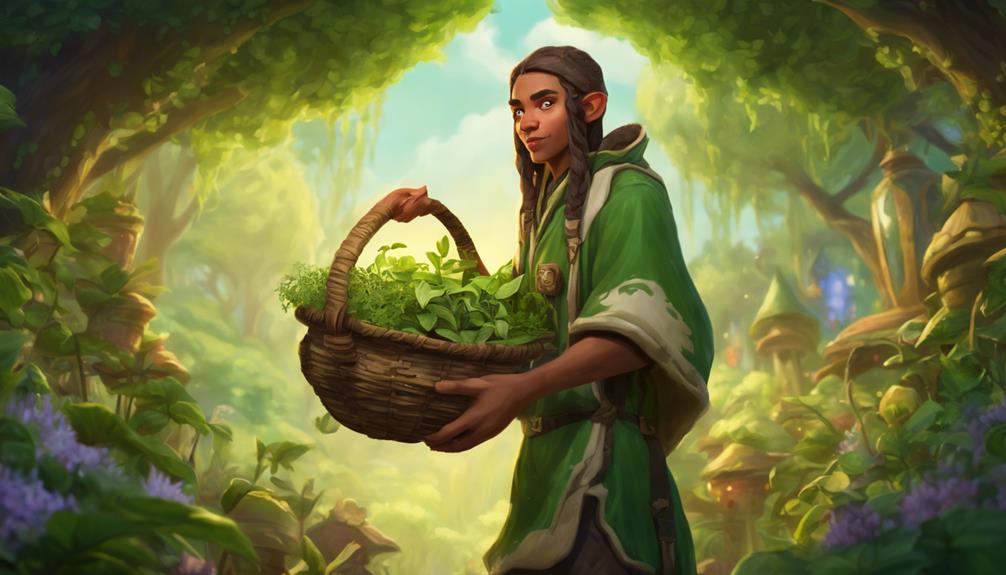
Now that we've found our trainers, it's time to get down to business and learn the basics of Herbalism.
We'll need to master the art of gathering herbs efficiently, so we can stockpile the resources we need to craft valuable potions and flasks.
As we start our journey, we'll focus on identifying the different herbs, preparing for harvest, and optimizing our gathering routes to maximize our yields.
Gathering Herbs Efficiently
As we venture into the world of herbalism, we'll want to master the art of gathering herbs efficiently to maximize our gains. To do so, we'll need to know where to look and how to optimize our gathering process.
Herbalism trainers in major cities can provide guidance on getting started, and they'll teach us how to use a herbalism tool to gather herbs from nodes in the game world.
When exploring the game world, we'll want to keep an eye out for nodes with green leaf icons on the minimap, indicating the presence of herbs. We'll also want to explore different zones and climates to find a variety of herbs, such as Mountain Silversage, Purple Lotus, and Golden Sansam, to level up our herbalism skill.
Additionally, we should stay aware of weather conditions, as rain or snow can affect herb availability. By following these tips, we'll be well on our way to gathering herbs efficiently and maximizing our gains in the world of WoW herbalism.
Herb Identification Guide
We'll need to familiarize ourselves with the different types of herbs we're gathering, so let's learn to identify the various species.
As we explore the vast lands of Azeroth, we'll come across diverse herbs, each with its unique characteristics. Some herbs, like Silverleaf and Peacebloom, are commonly found in starting areas like Mulgore, while others might be hidden in harder-to-reach zones, requiring a flying mount to access.
When searching for a particular herb, understanding that some only thrive in specific weather conditions is crucial, adding an extra layer of complexity to our gathering endeavors.
To make sure we're gathering the correct herbs, we can refer to our minimap, where herbalism nodes are marked with a green leaf icon. By clicking on these nodes, we can gather herbs and level up our herbalism skill.
As we progress, we'll discover more about the unique properties of each herb, allowing us to refine our gathering techniques and become more efficient herbalists.
Preparing for Harvest
To master the basics of herbalism, we must visit a trainer in major cities like Stormwind or Orgrimmar to learn the profession. Once we've learned the ropes, we'll need to obtain a herbalism tool to gather those precious herbs.
We can find these tools by clicking on the green leaf icons on our minimap, which will lead us to our first harvest. As we explore various zones in WoW Classic, we'll discover that each area has its unique set of herbs, so it's crucial to venture out and explore to gather a diverse range of herbs.
However, we'll soon realize that some herbalism nodes require a certain skill level to gather, so we'll need to keep leveling up our herbalism skill to access those coveted herbs. Additionally, completing herbalism quests can provide valuable rewards and materials to aid in leveling up the profession.
Gathering Herbs in Early Zones

We explore the world of herbalism by thoroughly searching the early zones for an abundance of valuable herbs that will help us advance our skills.
As we venture into the starting areas, we're on the lookout for Silverleaf and Peacebloom, which are abundant in Mulgore, Durotar, Tirisfal Glades, Elwynn Forest, and Teldrassil. These herbs are essential for progressing our herbalism skills, and we can't get enough of them!
As we progress, we'll find Mageroyal and Earthroot in zones like Westfall, Silverpine Forest, Loch Modan, and Darkshore. Briarthorn is another valuable herb we'll come across in The Barrens, Hillsbrad Foothills, Wetlands, and Stonetalon Mountains.
We'll also keep an eye out for Bruiseweed in Ashenvale, Stonetalon Mountains, and Hillsbrad Foothills. Finally, Wild Steelbloom can be found in locations like Stonetalon Peak, Arathi Highlands, and Hillsbrad Foothills.
Leveling Up in Outland Regions
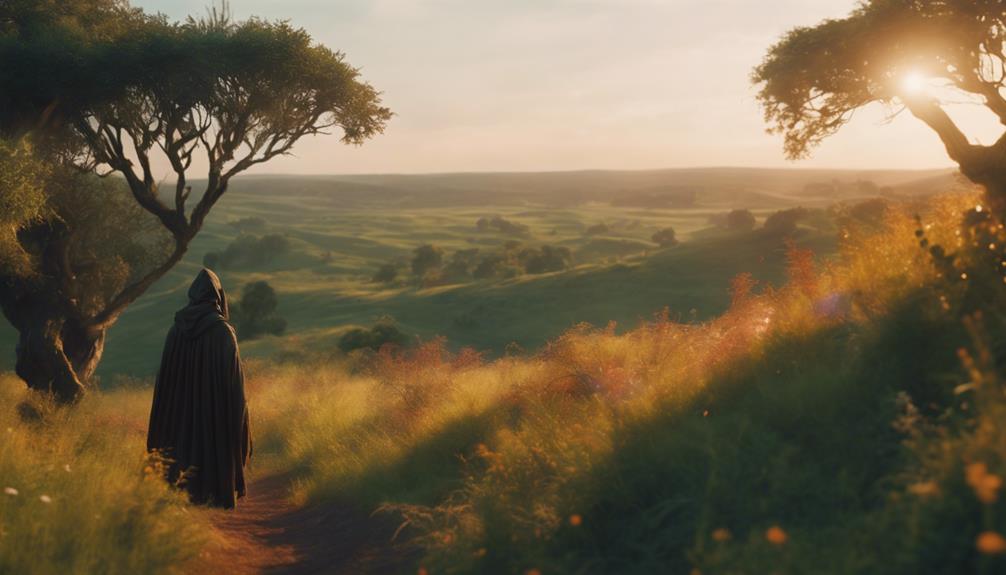
As we venture into the Outland regions, we're excited to explore the most efficient routes for gathering high-level herbs.
We'll navigate through the various zones, identifying the best spots to find rare herbs and optimize our leveling process.
Outland Herbalism Spots
Outland regions offer a wealth of herbalism opportunities, particularly in zones like Hellfire Peninsula, where abundant herb nodes await discovery between levels 300-315. As we venture further into Outland, we find that each zone provides a unique set of herbalism opportunities tailored to our skill level.
| Zone | Level Range | Herb Nodes |
|---|---|---|
| Hellfire Peninsula | 300-315 | Abundant herb nodes |
| Blades Edge Mountain, Nagrand | 315-325 | Herb nodes for leveling up |
| Terokkar Forest | 325-350 | Prime location for herb gathering |
| Netherstorm | 350-375 | Valuable herbs for leveling up |
We find that Blades Edge Mountain and Nagrand offer herb nodes for leveling up from 315 to 325, while Terokkar Forest is a prime location for gathering herbs between levels 325-350. Finally, for levels 350-375, we head to Netherstorm to find valuable herbs for leveling up our Herbalism skill. With such diverse opportunities, Outland regions provide a perfect environment for us to advance our Herbalism skills.
Best Routes for Herbs
To optimize our herbalism leveling in Outland, let's map out the most efficient routes for gathering valuable herbs in each region. We'll explore the best zones for leveling up our herbalism skills, making the most of our time and effort.
Here are the zones we'll focus on for each level range:
- 300-315: Hellfire Peninsula – a hotspot for herbalism leveling
- 315-325: Blades Edge Mountain and Nagrand – explore these areas for abundant herbs
- 325-350: Terokkar Forest – a treasure trove of herbs for leveling up
- 350-375: Netherstorm – the final stretch for maxing out our herbalism skills
To maximize our efficiency, we recommend utilizing addons or guides to optimize our routes and gathering strategies.
By following these routes and tips, we'll be well on our way to leveling up our herbalism skills in no time.
Remember to stay focused, and we'll reach our herbalism goals in Outland in no time!
Zones for Rare Herbs
We'll explore the Outland regions that hold the keys to finding those elusive rare herbs, essential for leveling up our herbalism skills in WoW Classic. As we venture into Hellfire Peninsula, we'll discover Dreaming Glory and Felweed, which will help us level up from 300 to 315.
Next, we'll head to Blades Edge Mountain and Nagrand, where we'll find Terocone and Fel Lotus, taking our skills from 315 to 325.
To reach herbalism skill level 350, we'll focus on gathering Ancient Lichen and Netherbloom in Terokkar Forest.
Finally, Netherstorm offers Nightmare Vine and Mana Thistle, helping us level up from 350 to 375.
Mastering Herbalism in Classic WoW
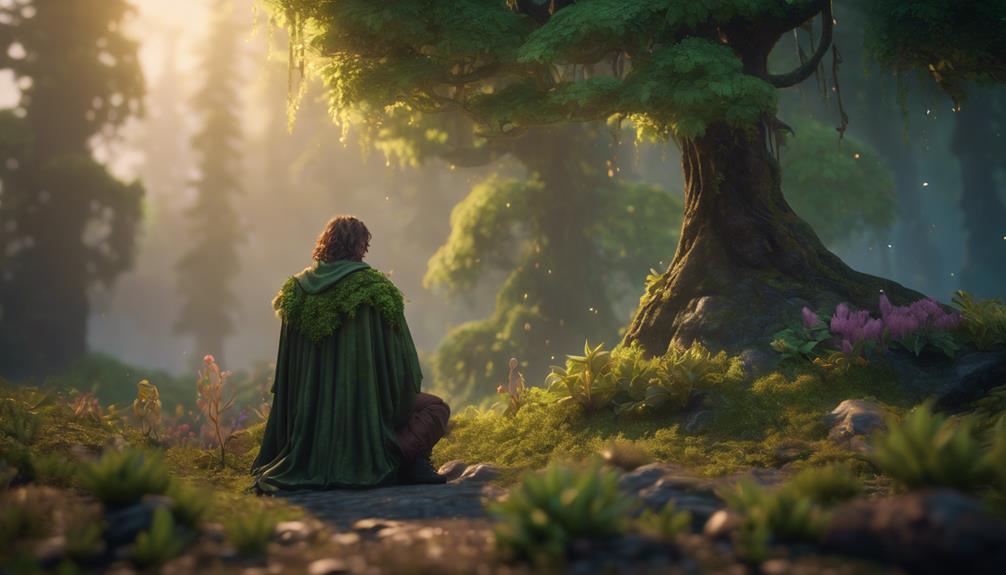
As we venture into the world of Classic WoW herbalism, we find that mastering this profession requires a strategic approach to gathering and utilizing the rarest and most valuable herbs. To maximize our herbalism skills, we need to focus on the most lucrative herbs, track the market demand, and join forces with other players to share resources.
Here are some key strategies to help us master herbalism in Classic WoW:
- Focus on valuable herbs: Identify the most sought-after herbs and prioritize gathering those to maximize our profits.
- Track the market: Keep an eye on the auction house and adjust our gathering strategy according to market demands.
- Join a guild: Collaborate with other players to share knowledge, resources, and expertise to optimize our herbalism skills.
- Explore extensively: Venture into different zones and areas to discover the rarest and most valuable herbs.
Advanced Herbalism Techniques
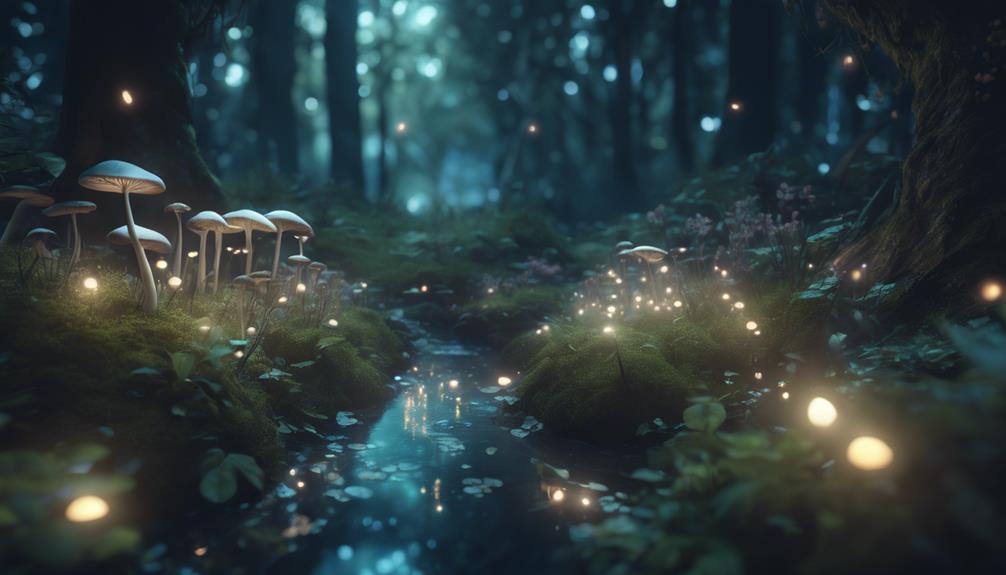
By refining our gathering strategy and adapting to market trends, we can now take our herbalism skills to the next level by employing advanced techniques to maximize our profits.
As we progress from levels 330 to 345, we focus on high-demand herbs like Dreamfoil and Mountain Silversage. Beyond level 350, we explore Zangarmarsh for Felweed, Ragveil, and Dreamfoil, taking advantage of the zone's herb diversity.
To optimize our gathering routes, we adapt to our server's population and utilize maps effectively. Understanding market demand is essential, so we monitor trends, selling strategically and diversifying our sales for maximum profitability.
Frequently Asked Questions
Where to Start Herbalism in Wow?
When we start herbalism in WoW, we head to major cities like Stormwind, Orgrimmar, or Ironforge to find a herbalism trainer. They'll teach us the basics.
Then, we explore starting zones like Mulgore, Durotar, or Elwynn Forest to gather herbs. We keep an eye out for green leaf icons on the minimap, marking herbalism nodes.
As we level up, we progress to higher-level zones, revealing new areas and herbs to discover.
Where Is the Best Place to Find Herbs in Wow?
As we venture into the vast world of Azeroth, we're on the hunt for the perfect spot to find those elusive herbs. We've scouted out the best zones, and our top picks include Mulgore, Westfall, and The Barrens, where a variety of herb nodes await.
For higher-level herbs, we head to Stonetalon Mountains, Arathi Highlands, and Tanaris, where the pickings are plentiful.
How to Get Herbalism Knowledge in Wow?
We're enthusiastic to learn herbalism in WoW, and the first step is to find a trainer.
We can visit major cities like Stormwind City, Orgrimmar, or Ironforge to locate a herbalism trainer. They'll teach us the profession and help us level up from Apprentice to Artisan.
One trainer can teach us all levels, so we don't need to search for multiple trainers. With their guidance, we'll be collecting herbs in no time!
How to Gather Herbs in Wow?
As we start our herbalism journey, we're excited to begin gathering those precious herbs.
To do so, we need to keep our eyes peeled for those green leaf icons on our minimap, indicating herbalism nodes.
A simple click on these nodes allows us to collect an array of herbs, such as Silverleaf, Peacebloom, and Briarthorn.
We'll find different herbs in specific zones and under varying weather conditions, so thorough exploration of the game world is crucial.
Conclusion
As we venture forth, our herbalism journey unfolds like a blooming wildflower, its roots digging deeper into the vast expanse of Azeroth.
From novice gatherers to master botanists, we've traversed the territories, unearthing secrets and techniques to cultivate our craft.
With each new discovery, our knowledge blossoms, and our passion for herbalism takes root, forever changing the landscape of our WoW experience.
-
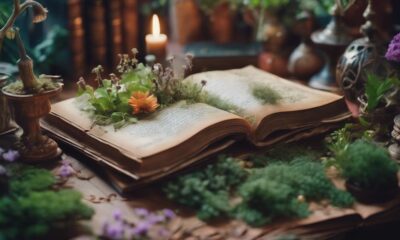
 Herbalism2 months ago
Herbalism2 months agoDoes Herbalism Actually Work?
-

 Anti Aging2 months ago
Anti Aging2 months agoMost Effective Anti-Aging Drink: 5 Top Picks
-

 Anti Aging2 months ago
Anti Aging2 months agoWhich Tea Increases Lifespan?
-

 Bone Health2 months ago
Bone Health2 months agoHerbal Secrets Unleashed: Boost Bone Density
-
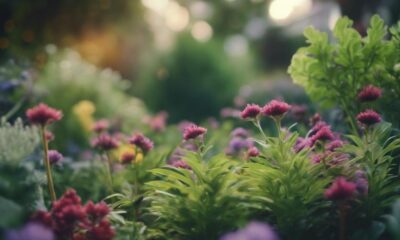
 Anti Aging2 months ago
Anti Aging2 months agoThe Immortal Herb: Unveiling Its Special Qualities
-
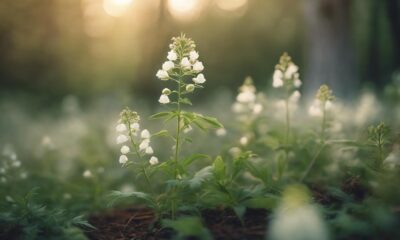
 Anti Aging1 month ago
Anti Aging1 month agoAstragalus: The Ultimate Anti-Aging Herb
-
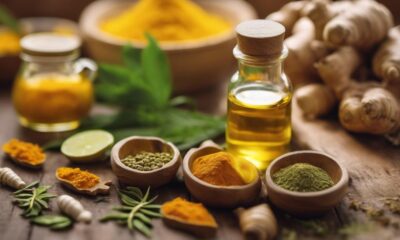
 Inflammation Management2 months ago
Inflammation Management2 months agoBest Natural Medicines for Joint Inflammation Relief
-
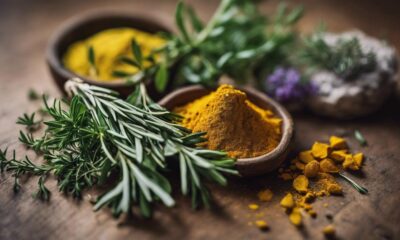
 Mental Health2 months ago
Mental Health2 months agoBest Herbs for Boosting Brain Health


















